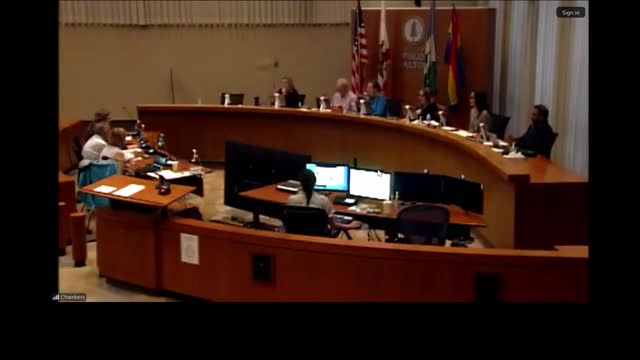Palo Alto Utilities outlines residential electrification rebates, EV and rate‑assistance programs
Get AI-powered insights, summaries, and transcripts
Subscribe
Summary
City staff described residential electrification incentives, EV outreach, a rate assistance program and other customer supports; commissioners asked about eligibility, usage trends and services for people living in RVs.
City of Palo Alto Utilities staff presented an overview of residential programs and customer services at the Human Relations Commission meeting on Thursday, describing electrification rebates, EV incentives, water‑use programs and low‑income assistance.
Rachel Franco, manager of utility program services, said the city’s Sustainability and Climate Action Plan (adopted in 2022) aims to reduce greenhouse gas emissions 80% by 2030 from 1990 levels and that the utilities’ residential offerings support that goal. Franco described programs that include home energy adviser consultations, electrification assessments (provided by Quick Carbon), leak‑alert services and rebates for insulation and permitting fees.
Franco outlined several electrification rebates: a residential heat pump water heater rebate of $3,500; a gas‑to‑electric heat pump rebate listed at $2,500 that increases to $5,000 for income‑qualified customers; incentives to remove gas meters; electric panel incentives; and financial help for attic and roof insulation and permit fees. She also described multifamily incentives, including up to $8,000 per EV charging unit for multifamily properties, and a soon‑to‑launch affordable‑housing electrification pilot to support central or in‑unit electrification in subsidized housing.
Tom Auzenne, assistant director for customer support services, described customer billing and low‑income supports. He said the utilities’ rate assistance program offers discounts (electric 25%, gas 25%, storm drain 20%) for eligible residential customers and that Project Pledge provides one‑time assistance for past‑due residential accounts (up to $750) funded by voluntary donations. Auzenne described payment arrangements and budget billing as additional tools to help customers manage costs.
Commissioners asked about program eligibility, recent survey findings and trends. Auzenne said the utility periodically benchmarks other agencies’ discount programs and that discounts vary widely across jurisdictions; he said Palo Alto currently serves roughly 640–650 customers on rate assistance and had about 114 customers on payment arrangements at the time of the presentation. He noted the city cannot offer discounts on refuse, water or sewer services that are parcel‑tied because of Proposition 218.
Commissioners also raised questions about outreach and how to advise residents who experience “sticker shock” from higher bills; staff recommended comparing consumption year‑over‑year and offered the Home Energy Adviser service for one‑on‑one assistance. Commissioners asked about services for residents living in RVs; staff said utility services require meters to be billed and that some responses (dumping stations, temporary arrangements) sit outside core utility billing. Franco and Auzenne said they would follow up on ideas, including possible grant‑funded pilot approaches and referral to human services for wraparound support.
A public commenter, Flora, described difficulty paying utility bills on a fixed income and urged the city to do more for people who cannot afford rates. Franco and Auzenne acknowledged the concern and offered cards and follow‑up for residents seeking assistance.
No formal motions or votes were taken on utility programs at this meeting; staff said several new or expanded offerings (including an affordable‑housing electrification pilot and a full‑service heat pump installation program) will be rolled out in the coming year.
